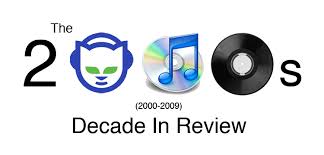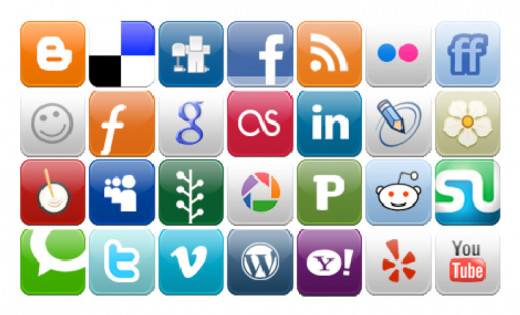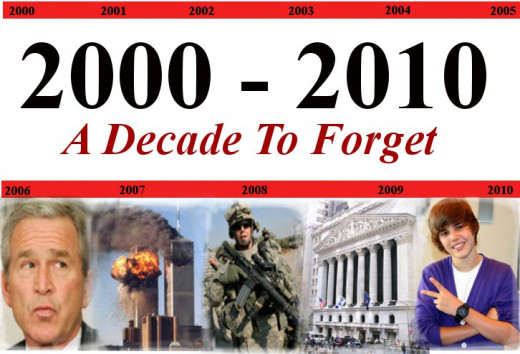The 2000s (The Decade That Defined Gen Y): Part 7 (Final Part) - Technology

The Rise of '.mp3' Music, Digital Media and Peer to Peer File Sharing
If any development within TV and music can be consigned to what defined the 2000's, then hands down it has to be the development of mp3 music files and the conversion of what we could once only view on the TV or listen to on the radio to digital files freely portable from one computer to another.
Thanks to applications like Music Match, WinAmp and even Microsoft's own Windows Media Player, users were already able to copy the contents of their audio CD's to their hard drives in the form of files containing either the 'wma' or 'mp3' format (depending on the application in use) and this is where our generation came up with words like 'burning' and 'ripping' CD's.The internet's growth during the mid to late 1990's had already shown the world what a network of computers connected across the world was capable of but it wasn't until the late 90's and early 2000's that a young college lad named Sean Parker launched a 'peer-2-peer' file sharing software called 'Napster'.
Essentially what Napster allowed its users to do was to use their internet connection and share their own directories in their PC's to allow other users using Napster to simply download files available on the host's computer - these downloads could be anything from digital video files to songs. Considering Sean Parker had a 'first mover' advantage in the industry, the use of Napster soon went viral across the world and essentially changed the way people brought music.
The Record industry association soon realized that users were unknowingly engaging in piracy by using Napster (and many other peer-2-peer software like Audiogalaxy, LimeWire and Kazaa) and sued Sean Parker for damages. Major record labels including BMG and Sony-Music backed by many artists including the likes of Metallica, successfully had the court order that Napster be shut down and to make an example of it, some users who heavily engaged in downloads off Napster were asked to pay out.
Over the course of the decade, the business-model around sale of music did change (to allow digital downloads become legal if customers were wiling to pay for it) and today, it has actually become the norm for virtually anyone with a computer or a smartphone to download digital music or videos rather than going to a store and buying a CD or a DVD.
'Downloaded' (The Napster Documentary): Tralier
'Downloaded': Movie for Sale
Charlie Rose interviews rapper Chuck D. and Metallica drummer Lars Ulrich about Napster
The rise of Smartphones and the Dominance of Apple and Google
It is no secret that during the turn of the 2000's and the end of the 1990's, Finnish phone maker Nokia and its Swedish rival Ericsson were the dominant players within the GSM-mobile phone market.
However, during the dawn of the 21st century, the trend within the technological space was to 'shrink' and get more compact - whether it was increasing reliance on laptops or to get more functionality out of your mobile phone than it simply being used to only answer phone calls or send messages.
Sadly Nokia never caught on with this growing demand to make your phone into a mini computer as newer manufacturers such as Sony and Britian's O2 began making handsets which could technically be defined as the first evolution from a standard 'palm-top' to the first 'Smartphone' i.e. a computer and a phone in one.
It however wasn't until Apple's entry into the market (their I-Pod already being the forerunner among the best selling 'mp3' players) that sales and demand for smart-phones really began taking off. Under the stewardship of the late CEO Steve Jobs, Apple essentially began producing products under its brand to serve seamless compatibility between its I-pod, its new I-phone and Macintosh PC's and laptops - all under one 'Apple ID' for each customer. By the mid 2000's, Apple's online ITunes Store had become the benchmark for judging digital music and video sales (with many record labels and music channels judging the success of an artist by how many copies of their albums or singles sold on ITunes) and this meant that Apple piratically dominated the entire music and personal communication industry (apart from Samsung and their Google Android platform) and they still do dominate this space within the consumer technology sector to this day.
While Apple maybe at the forefront of mobile connectivity and the music industry, the other giant which virtually ruled everything online (and still does) was Google. Started during the late 90's as an experimental search engine, Google over the first decade of the 21st century, has virtually become a monopolistic power on everything that happens on the Internet thanks to its continuously innovative strategies to monetize and link people with as much information as possible. It was during the 2000's that Google overthrew the dominance of Yahoo (the primary search engine during the 90's and early 00's) and has even managed to establish itself as a verb in major dictionaries, apart from offering state of the art services like 'Google Maps', 'Street View', 'Google Earth' and even dominating e-commerce thanks to their Adwords and Adsense programs.
Together, Google and Apple essentially define how we do business and leisure on the internet (and how we did since the 2000's) and have more or less established the way Generation Y uses technology today.
The Decade long Rivalry between Apple and Google

The Rise and Dominance of Online Social Media
Last but definitely not the least, what clearly separates us within Gen-Y from our predecessors is how we were one of the first people in the world to literally witness the explosion of social media during the 2000's and more specifically, the rise of the big 3 companies within this space, Twitter, YouTube and Facebook.
During the 90's and thanks to companies like Yahoo, Microsoft and ICQ, my generation of children (when we were teenagers) were already exposed to online chat software like Yahoo and MSN messengers, which sort of served as the founding platforms of future 21st century social outlets such as Orkut and Hi-5 (which I'd say were the first true social-media websites during the 2000's).
However, despite the popularity of Hi-5, it wasn't until 2006 that MySpace, a website backed by Rupert Murdoch's News Corporation (and primarily aimed at music artists wanting to promote themselves) followed by video-sharing website YouTube that the use (and sadly, abuse) of online social media really began taking off as a brand new way people communicated with each other. YouTube was essentially considered the Napster for Videos and upon realizing that users were uploading movies and music videos, many artists and record labels including music channel companies sort a legal injunction against YouTube that it should take down all copyrighted content off its sight - This move was however repealed by the higher court who advised the channel companies and music labels that while uploading copyrighted content was illegal, there's no cause for why they themselves cannot upload their own content (i.e. music videos and movies etc.) for more exposure.
A year later, the sudden uncontrolled and yet accidental growth of Facebook (launched by Mark Zuckerberg with the help of Napster creator Sean Parker) permanently changed the way our generation (and even our seniors) interacted with almost everybody across the world, with major businesses changing their entire business models to incorporate heavy use of social media within their marketing strategies - something which has exponentially exploded into this decade.
With the advent of Micro-blogging site Twitter (helpful with Breaking News stories) and Linkedin (A social network for recruiters and job-seekers), the days of the old-fashioned e-mail, chat software or even a telephone call's certainly behind us and this is one facet of our daily lives which truly defines our identity as Generation Y babies.
The Social Network (2010): Trailer
'The Social Network': Movie for Sale

CONCLUSION
So here it is - My grand review of the first decade of the 21st century and the key events which took place during it and why they're so important in essentially defining the sensibilities of almost anyone born after 1980 (i.e. Generation Y).
While I acknowledge I might have missed a few events as I was writing this article based on research but also on my own memory of events, I do sincerely hope that this article will serve as a benchmark for anyone willing to take a trip down memory lane into their youth and also into a rather chaotic time of our lives - which is why I believe they sometimes do say the 2000's was a decade one can afford to forget.
I beg to differ :)
Previous Articles In This Series about the 2000s






